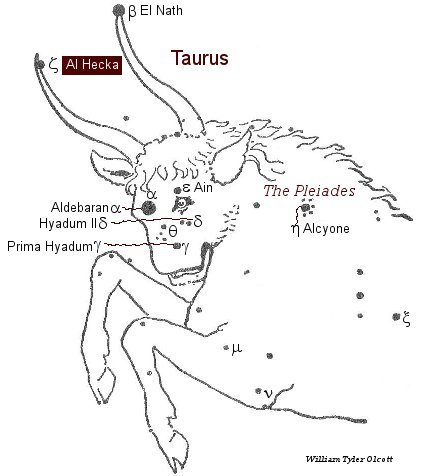| Fixed star: AL HECKA | |
| Constellation: Zeta (ζ) Taurus | |
| Longitude 1900: 23GEM23 | Longitude 2000: 24GEM47 |
| Declination 1900: +21.05′ | Declination 2000: +21.09′ |
| Right ascension: 05h 37m | Latitude: -02.11′ |
| Spectral class: B2 | Magnitude: 3.0 |
The history of the star: Al Hecka
from p.391 of Star Names, Richard Hinckley Allen, 1889.

Al Hecka was the determinant star of the 7th ecliptic constellation of Babylonia, Shur-narkabti-sha-shutu, the Star in the Bull towards the South, or the Southern Star towards the Chariot (Auriga).
Reeves gave it, with others near by, as the Chinese Tien Kwan, the Heavenly Gate.
In astrology this star, zeta (ζ Al Hecka), has been considered of mischievous influence.
Star Names, Their Lore and Meaning, Richard Hinckley Allen, 1889].
The Bull’s South or Following Horn, sometimes called "the Driver". [Robson, p.125.]
In slang, to have the ability to deal with difficult situations forcefully and decisively, is to "take the bull by the horns". The horns of Taurus are shaped like a crescent moon. There was an Assyrian saying "to break the horn of the bull" is "to break the power". Taurus, was called the "Breaker" or "Opener" of the new year when it marked the vernal equinox from about 4000 to 1700 B.C. and in astronomical symbolism the bull is shown breaking the annular egg with his horns.
Etymology
AL HEEK; A bull’s southern horn. In Arabic, hakka is to scratch or gore. Hebrew HaKHaH is a fishing hook, and, of course, the source of English HOOK. Fishing requires patience as well as angling with a hook, so the notable Taurus patience might be a factor here, before there is an explosion of horned anger. Hebrew HaCKeH also means to wait. The star description mentions power, another meaning of the Hebrew and English source of “horn.” The unprovoked AL HEEKA native can be gentle, but when the horns finally do come down, you don’t want to run those Pamplona streets. [Isaac Mozeson, author of The Word Dictionary].
The astrological influences of the constellation Taurus
Legend: Jupiter, assuming the form of a bull, mingled with the herd when Europa, with whom he was infatuated, and her maidens disported themselves on the sea-shore. Encouraged by the tameness of the bull Europa mounted it, whereupon the God rushed into the sea and bore her away to Crete. According to other accounts Taurus represents Io whom Jupiter turned into a cow in order to deceive his wife Juno. [Robson, p.62-63.]
Influences: Ptolemy makes the following observations: "Those stars in Taurus which are in the abscission of the sign resemble in their temperament the influence of Venus, and in some degree that of Saturn . . . the stars in the head (except Aldebaran) resemble Saturn, and, partly, Mercury; and those at the top of the horns are like Mars." By the Kabalists Taurus is associated with the Hebrew letter Aleph and the 1st Tarot Trump "The Juggler." In all the ancient Zodiacs, Taurus is the beginning sign and marked the Vernal Equinox from about 4,000 to 1,700 B.C. [Robson, p.63.]
The astrological influences of the constellation Taurus given by Manilius:
"The Bull will dower the countryside with honest farmers and will come as a source of toil into their peaceful lives; it will bestow, not gifts of glory, but the fruits of the earth. It bows its neck amid the stars and of itself demands a yoke for its shoulders. When it carries the sun’s orb on its horns, it bids battle with the soil begin and rouses the fallow land to its former cultivation, itself leading the work, for it neither pauses in the furrows nor relaxes its breast in the dust. The sign of the Bull has produced a Serranus and a Curius, has carried the rods of office through the fields, and has left its plough to become a dictator [eque suo dictator venit aratro]. Its sons have the love of unsung excellence: their hearts and bodies derive strength from a massiveness that is slow to move, whilst in their faces dwells the boy-god Love (Cupido)." [Astronomica, Manilius, 1st century AD, book 4, p.233].
The astrological influences of the star Al Hecka
According to Ptolemy it is of the nature of Mars, but Alvidas suggests that of Mercury and Saturn conjoined. It gives violence, male violence and danger of accidents. [Robson, p.125.]
With Sun: Suspicious, reserved, studious, unfavorable for health and especially for the lungs, aptitude for military enterprise and stratagems but danger of deceit and ambushes. [Robson, p.125.]
With Moon: Quarrels, evil habits and company, depravity. [Robson, p.125.]
With Mercury: Hasty temper, selfishness, greed, dissipation, legal and business troubles, poor health, domestic troubles and separation from wife or children, low companions, loss of wealth and poverty. [Robson, p.125.]
With Venus: Unfortunate, low companions, bad environment. [Robson, p.126.]
With Mars: Evil companions, bad habits, sex troubles, and afflictions of a Mars-Venus type. [Robson, p.126.]
With Jupiter: Hypocrisy, dissipation, business losses and disgrace. [Robson, p.126.]
With Saturn: Uncontrolled passions, drink, debauchery, perverted genius, clever writer of undesirable literature, luxurious surroundings but little wealth, isolated or confined at end of life, domestic unhappiness, accidents if Mars is also afflicting. [Robson, p.126.]
With Uranus: Legal difficulties, trouble through occultism, danger of imprisonment but help from friends, unfavorable for love and marriage, parental disharmony, little wealth, death from an accident. [Robson, p.126.]
With Neptune: Accidents, secret enemies, great psychic powers, wife may be sickly or die soon after marriage, favorable for gain but many losses in latter part of life, sudden troubles of a Mars nature. [Robson, p.126.]
References:
Fixed Stars and Constellations in Astrology, Vivian E. Robson, 1923].